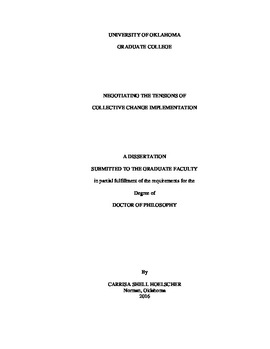| dc.description.abstract | Given the increasing number of interorganizational collaborations across governmental and private sectors, this study furthers theoretical understanding of these important relationships by focusing on dialectical tensions experienced in a collective change effort. The site of this study was an 11-member state-wide interorganizational board tasked with the goal of creating practice and policy change across all involved organizations. Data collection included prolonged observation of meetings over a period of 18 months and multiple interviews with taskforce leaders. Analytical procedures began with a modified version of constant comparative analysis that ultimately guided the research toward a tension-centered approach for ongoing data collection and analysis. The use of dialectical theory allowed for a deeper understanding of the meaning-making processes of the taskforce under investigation.
Results indicated seven specific dialectical tensions representing three broad tensions types: commitment-based tensions, process-based tensions, and outcome-based tensions. Commitment-based tensions included the collaborative/competitive tension and the skepticism/optimism tension. Process-based tensions were the full participation/continued progress tension and the creativity/parameters tension. Last, outcome-based tensions included the impactful change/viable change tension, the broad progress/nuanced progress tension, and the necessary change/palatable change tension. Further, three unique strategies for discursively negotiating such tensions included privileging one pole of a tension, balancing or alternating between both poles of a tension, and/or moving action forward. Finally, the seminal contribution of this study is the finding of four distinct communicative tactics utilized to implement a given negotiation strategy. These communicative tactics were acknowledging, suspending, hedging, and deferring to authoritative texts.
This study contributes an extension of dialectical theory by distinguishing between the strategies or goals apparent when participants are negotiating tensions and the communicative tactics utilized to achieve those strategies. The results of this study clarify how negotiation strategies and communicative tactics are separate but related, consequently providing a more complete overall picture of the group meaning-making process. Theoretical and practical implications of these findings are offered as a means of better understanding and negotiating dialectical tensions in collective change efforts. | en_US |
